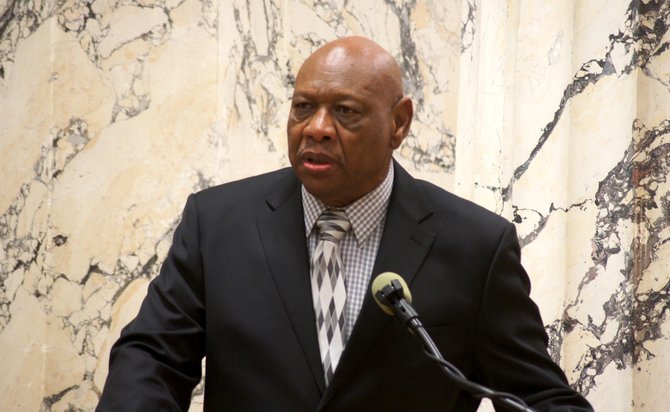Jimmie Robinson, president of the Virden Addition Community Association, has a radical solution to crime: love. Photo by R.L. Nave.
At a forum in Jackson last week, more than 100 people descended on the Mississippi Capitol to combat what organizers called the "recent onslaught of crime in Jackson."
Among the innovative crime-fighting solutions audience members proposed were having church leaders meet periodically, building more community centers, locking up criminals for longer periods of time and praying harder.
Jimmie Robinson, the president of the Virden Addition Community Association, offered perhaps the most radical ideas.
"Put your arms around a young black man, and let them know you love them. Treat them nice, and show them you care," Robinson said.
He could be dismissed as naive, but Robinson is a septuagenarian Army veteran who lives in a neighborhood that has seen five homicides in recent months; many of those victims were young and black. In September, William Brown was shot and killed outside his home after feuding with a man the previous night. The previous month, the teenagers Jason Murphy and A.J. Barber were also murdered in the neighborhood.
Robinson recognizes the tragedy of those murders, but is also frustrated at the local news media for being so quick to report killings while ignoring positive stories in Jackson. "I know you have to keep ratings up, but the most important thing is human life," Robinson said at the meeting.
To be sure, violent crime has dominated news coverage in recent weeks. State Sen. John Horhn, who organized the meeting, said that a "tipping point" for him was the murder of 7-year-old Jaidon Hill. Hill, along with his mother and stepfather, were killed earlier this month. The family, who lived in Brandon, had been missing for about a week before investigators discovered their bodies in Copiah County. Police arrested and charged two Jackson men in connection with the deaths.
"I don't know what was going on with the adults in that family, but that child did not deserve to die," Horhn said at the Capitol, eliciting nods of approval and applause.
In a twist of irony, Horhn himself became a criminal statistic when Jackson Police arrested him on suspicion of DUI. Data from the Centers for Disease Control and Prevention show that of the 1,210 traffic deaths among children through the age of 14 years in 2010, approximately 17 percent involved an alcohol-impaired driver.
Overall in 2010, about 10,228 people died in alcohol-related car crashes, representing nearly one-third of all the nation's traffic-related deaths.
At Horhn's forum, there was little discussion of crimes such as DUIs. Most of the conversation centered on property crimes that young people commit for fast cash. Of the more than 100 people who attended, many had stories about being victims of smashed car windows, stolen cars, home and business burglaries, and home invasions.
Jackson Mayor Chokwe Lumumba, whose eldest son, Kambon, was shot in the head years ago but survived (he remains paralyzed), stressed the importance of maintaining the proper perspective on crime.
"Anywhere you go in the world where you have bad economics and bad education, you have crime," Lumumba said. He noted that his office is growing the city's public-works department as the city version of a stimulus program and is participating in Alignment Jackson, a consortium of government agencies and nonprofit groups working on education in the capital city.
Ingrid Cloy, another audience member, framed Lumumba and Robinson's points a different way.
"Stop talking about crime," Cloy implored. "Crime is not the problem—crime is a symptom of the problem."



Comments
Use the comment form below to begin a discussion about this content.
comments powered by Disqus